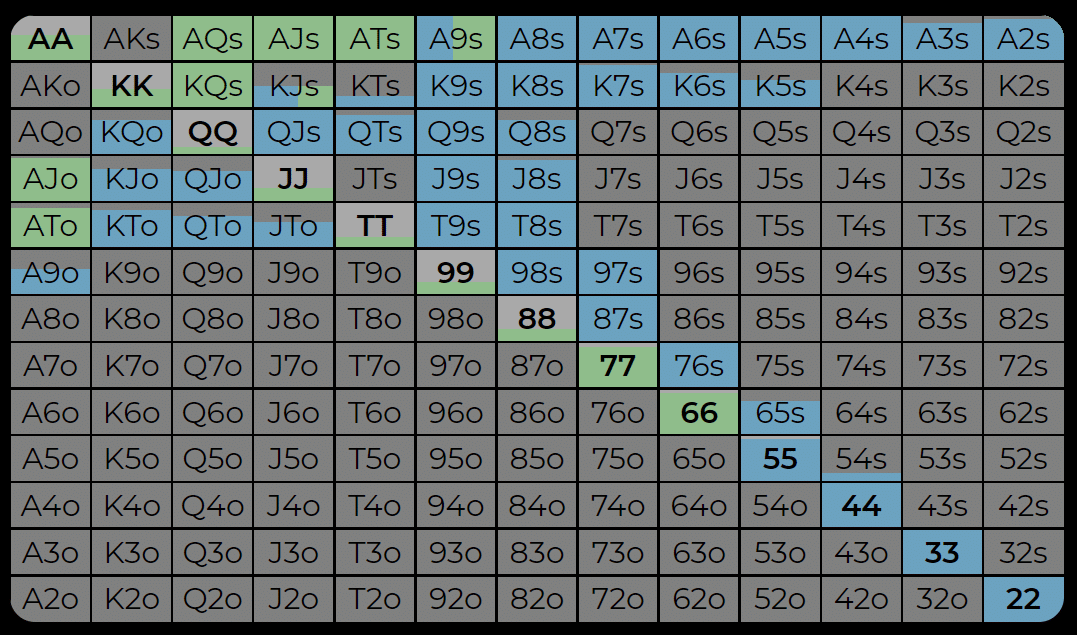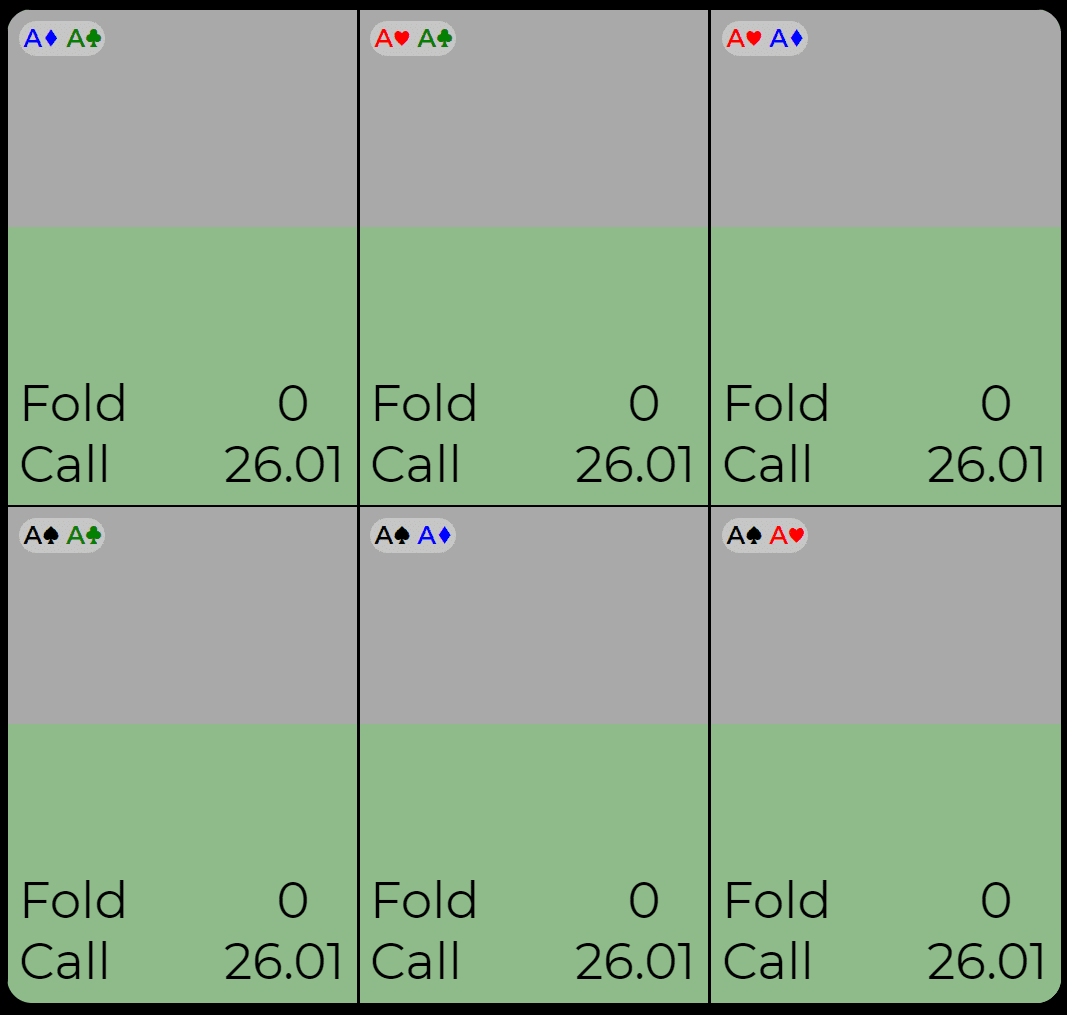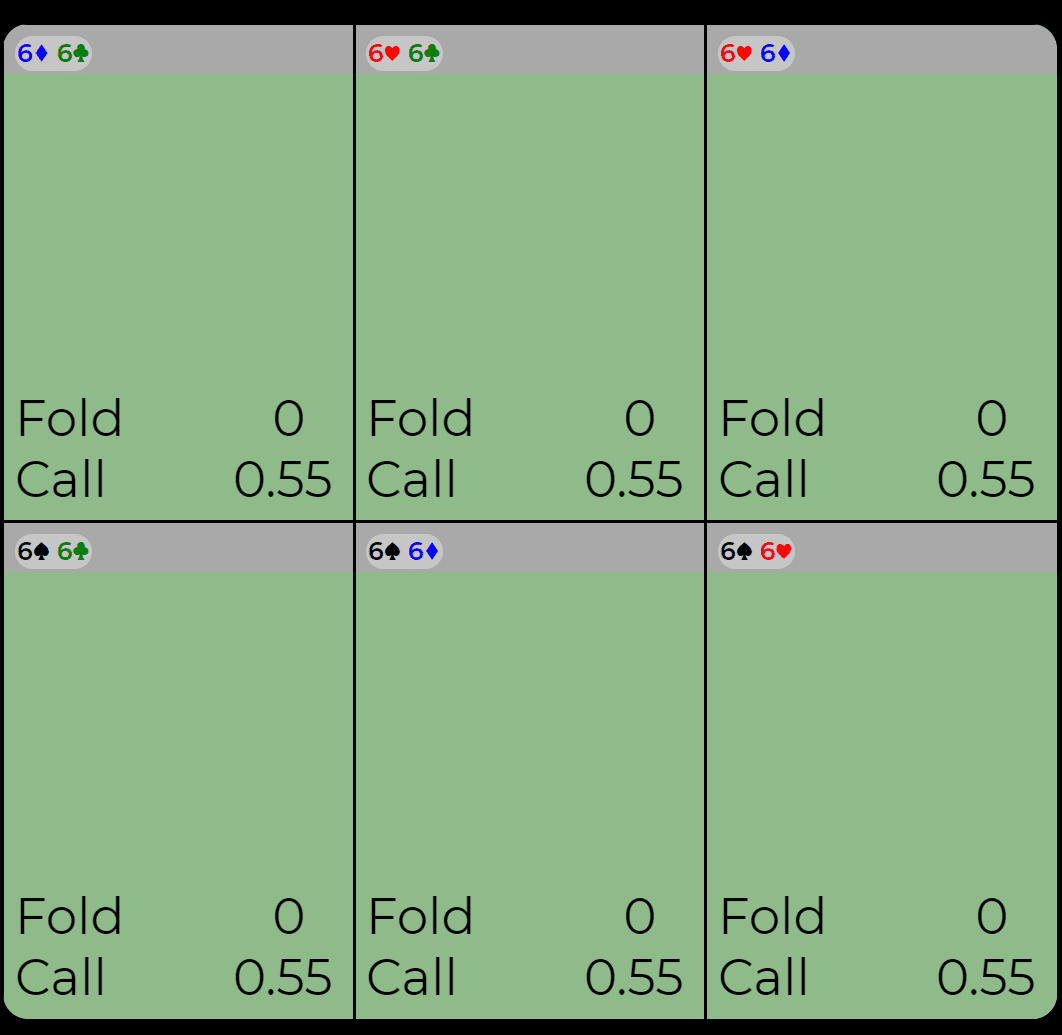“Gotta know when to carry ’em, know when to fold ’em.” – Kenny Rogers
Folding AKo to chilly 4bet 5-handed in WSOP Foremost Occasion. – Kenny Hallaert
In right now’s article, you’re going to study what the 2 nice Kennys know is without doubt one of the most vital abilities in event poker.
Whereas constructing huge stacks is crucial for fulfillment in MTTs, and mastering ICM is large to your ROI, this text is about neither of these abilities. These important areas have immense computational energy and 1000’s of lab hours backing them, producing correct, money-printing methods.
The talent we’ll give attention to lives within the uncomfortable, speculative unknown. It requires sharp instincts and the flexibility to place all of the items collectively higher than your opponents.
It’s referred to as edge-passing.
What’s Edge-Passing?
Edge-passing is precisely what it seems like: passing on an edge—often within the type of a fold. In a sport that rewards cumulative worthwhile selections, edge-passing can appear counterproductive. Making a behavior of folding if you’re not “speculated to” means your opponents’ bluffs achieve EV. Do it too typically and your opponents print.
And don’t neglect the affect of a villain’s profitable, proven bluff in your ego. Feels unhealthy, man.
Instance
Earlier than going any additional, let me illustrate. Think about you’re enjoying 30bb efficient stacks. The Cutoff opens, you name on the Button, the Small Blind shoves all-in, the Cutoff folds, and the motion is again on you. How do you proceed?
Have a look beneath.

Lucid GTO cEV chart – 30bb efficient stacks
Button response dealing with Small Blind shove after Cutoff open and Button name
On this instance, the underside of your calling vary contains 66, ATo, A9s (54% frequency), and KJs (45% frequency). The combined calls break even, ATo earns 0.38bb, and 66 earns 0.55bb. Over the long term, calling off with this vary versus a stable Small Blind reshove vary appears to be like flawless.
Or does it?
That is the place issues get murky—and why the subject has fueled numerous research group debates.
Why is that?
Future Recreation Concerns and the Drawback with Them
Not like the Six Million Greenback Man, we don’t have the know-how—but.
The research instruments presently out there to the general public are extraordinarily restricted of their means to resolve future sport conditions. A program like HRC (Maintain’em Assets Calculator) can account for future palms, however solely a small quantity, and solely preflop. Equally, what we have now for each preflop and postflop is capped at 3-handed play.
This isn’t essentially an issue. What it exhibits is that MTTs are removed from solved and that enjoying speculatively isn’t inherently flawed. So long as your rationale is coherent, the prospect that your deviation produces increased EV or ROI than the pc’s output is effectively above zero.
The difficulty is that you simply danger being flawed when there’s already a clearly worthwhile play. Having to clarify to your backers why you deviated might be awkward, painful, and tense—particularly if the deviation didn’t work out. In these circumstances, it’s vital to have an inexpensive rationalization to your “unhealthy” conduct, which is precisely what I’ll get into within the subsequent part.
When to Edge-Move
What causes may it’s important to edge-pass?
To reply this, ask your self a couple of key questions in-game. Doing so will aid you “brainsolve” a defensible resolution.
Q1. What Am I Giving Up?
Earlier than you resolve to fold your hand, it’s crucial to know what that hand is definitely price. Within the first instance, the Button’s 66 makes 0.55bb as a name versus the Small Blind’s reshove. That’s assured EV straight to your pocket.
Whereas that is worthwhile, it’s vital to check the EV of your hand to the highest-EV combos in your vary. Preflop, which means pocket aces. On this occasion, holding AA is price about 26bb. Your pair of sixes is price roughly 2% of what aces are price.
The purpose is straightforward: in case you fold, you’re not giving up a lot.
|
|
|
|---|
Some execs undertake a 5% minimal of aces, whereas others select 10% as their stack-off threshold. On this occasion, the previous would stack off with 77, ATs, KQs, and AJo. The latter wouldn’t name with lower than 88 or AJ.
This highlights the speculative nature of edge-passing—the traces are arbitrary. The following query will aid you resolve the place to attract yours.
Q2. What’s My Edge in This Recreation?
Precisely estimating the way you fare towards your opponents is a large think about deciding whether or not it’s time to edge-pass. Sizing them up appropriately requires disciplined objectivity, since being contemptuous towards your competitors in poker is just not solely straightforward—it’s expensive.
You’ll wish to think about this query in three layers.
1. How am I doing relative to your entire area?
Naturally, larger-field MTTs present extra worth since they appeal to weaker competitors. In case your talent set is clearly above the event common, passing on barely worthwhile spots will typically end in higher long-term outcomes than strict GTO play.
Rising your personal variance in comfortable fields advantages the weaker gamers, since they get to gamble towards you and scale back your means to understand edge postflop.
In harder fields, taking marginally worthwhile spots is far more forgiving. The ROIs of successful gamers are already decrease because of the increased caliber of competitors, so locking in assured EV is welcome.
2. How am I doing relative to my desk?
This level echoes the earlier one, however right here the main focus is in your desk somewhat than your entire area (which may really feel extra summary). On the desk stage, you’ve gotten entry to quick, real-time data, permitting you to execute a way more exact technique.
When your desk has the next focus of weaker gamers, you ought to be reluctant to flip or take marginal preflop spots. Even at a tricky desk, if the broader area accommodates loads of lifeless cash, it may be very wise to carry out for a desk break—or for a couple of bust-outs to usher in contemporary opponents.
3. What stage of the event are we at?
This issues—quite a bit.
In Upswing’s new Lab 2.0 with Phemo, a high-stakes crusher and coach, he explains that the objectives of every stage of a event differ. That is essential if you’re dealing with a marginal name, guess, or bluff.
Within the earliest phases, you’ve gotten loads of time to build up chips from weaker competitors. Because the event nears its finish, nonetheless, the focus of harder gamers calls for larger respect for the sport—which means you may must flick in that uncomfortable name.
The important thing concept is that past the common competitors of the sector and your desk, it’s essential to account for the calls for of the present stage. Some flips, even when gained, double your stack however don’t double your ROI. Others—similar to a flip on the ultimate two tables—can imply enjoying for almost all of chips in play, massively rising your probabilities of a podium end or outright win, which skyrockets your ROI.
Q3. What Occurs When?
So— the EV of your combo. You know the way you fare towards the sector, your desk, and the present stage of the event. And you continue to aren’t certain.
Okay. Properly, what occurs when?
Within the first query of this protocol, you’re weighing EV danger and reward. This one is totally different. EV danger and reward is in regards to the bushes. Asking what occurs when is about seeing the forest.
Answering this query requires each instinct and foresight. You might want to visualize how future situations might play out relying on the choice you make. To do that effectively, it’s essential to perceive the opponents at your desk. How will they reply when the desk dynamic shifts after this hand?
In potential all-in conditions, you wish to know three issues:
1. What occurs if I double up (Name and win)?
As talked about earlier, the good thing about doubling up varies relying on the stage of the event.
For instance, in Hand 1 of the event, doubling up from 200bb to 400bb has little affect in your probabilities of successful the event and even making the cash. This highlights the lowered incentive to gamble early for small EV positive factors.
Do you actually wish to play for stacks 200bb efficient with AKo or QQ? That’s as much as you. However flipping and successful with 66 at 15bb efficient when three tables stay—and the chip chief has 40bb—can produce glorious outcomes.
For those who win, you turn into one of many contending stacks and put your self in a a lot stronger place to achieve the ultimate desk. The additional chips additionally allow you to open extra palms comfortably and apply stress to the stacks shorter than yours.
2. What occurs in the event that they double up (name and lose)?
This query ought to think about your opponent’s tendencies and their place, on high of the factors already mentioned.
For instance, let’s say your opponent is aggressive and sits on to your left. Doubling them up will imply dealing with much more future resistance.
Or think about in the event that they’re seated on to the left of the desk whale. Do you actually wish to give them the stack that enables them to run over the weakest participant on the desk—at your expense—when your upside is barely marginal EV?
The precept right here is straightforward: even when the foundations recommend a name, you don’t wish to harm your future prospects.
3. What occurs if I fold?
It’s vital to not overlook this one. For those who scale back each resolution to a “this or that” dichotomy, you miss out on the potential advantages of the third choice.
In right now’s instance, you’ve gotten 66 with 30bb. Calling is price simply over half an enormous blind. You’ve already invested 2.2bb from calling the Cutoff open. For those who fold, your opponent positive factors a small EV increase from gathering the open, your name, the large blind, and the antes. Nonetheless, you keep ~28bb—a stack that performs very equally to 30bb.
Nearing the cash however not fairly on the bubble, you may select to muck it. Folding right here preserves your means to proceed making profitable opens and c-bets with out a lot disruption.
Finally, folding is the proper selection when calling and shedding and calling and successful don’t considerably enhance your state of affairs—and when the EV of your hand is, frankly, meh.
At this stage of the protocol, the bottom line is seeing all potential outcomes and deciding on the one which serves you greatest—not simply on this event, however in your profession. (For instance: Tamayo’s fold with QQ within the 2024 WSOP Foremost Occasion.)
Key Takeaways:
Edge-passing is the act of deliberately passing on worthwhile spots, often in preflop all-in situations. “Ready for a greater spot” is actual. You edge-pass if you purpose that surviving to struggle one other day will reward you greater than blindly mimicking GTO options.
When edge-passing, ask your self:
- What am I giving up? Know the EV you’re sacrificing.
- What’s my edge on this sport? Assess the way you stack up towards the sector and your desk.
- What occurs when? Map out the attainable outcomes of your selections and resolve which one greatest serves your event life and profession.
And when doubtful, belief that the pc is aware of what it’s speaking about.
Good luck on the market.
When to 3-bet? When to not 3-bet? Be taught all about assemble your MTT 3-bet ranges right here: Constructing Bluffing Ranges Just like the Professionals: A Information to Smarter 3-Bets.


